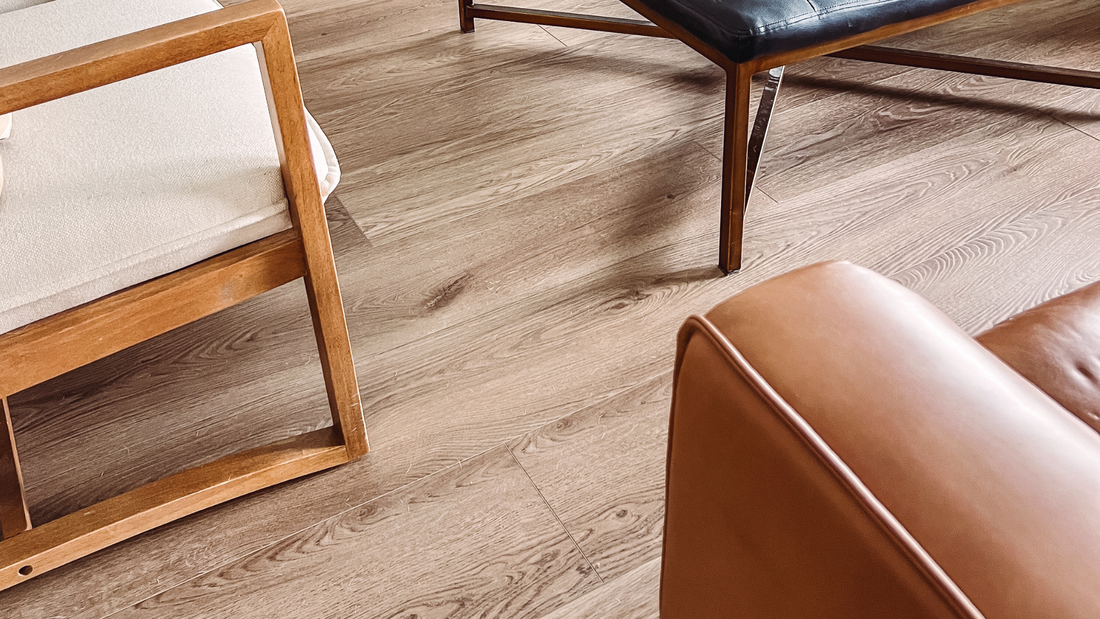When selecting new flooring, it’s important to find a material that meets your needs in both aesthetics and durability. Our innovative Stoneform® flooring has quickly gained popularity for its versatile design, water resistance, and unmatched durability. But how does it truly compare to traditional options like LVT, Bamboo, Laminate, Tile, and Hardwood? We’ve compiled this comprehensive guide to help you weigh the pros and cons of each and see if Stoneform® is the right choice for your home.
Stoneform® vs. Luxury Vinyl Tile (LVT)
Luxury Vinyl Tile (LVT) has long been a go-to for those seeking an affordable, water-resistant, and versatile flooring option. However, Stoneform® elevates these features with an enhanced composition that includes natural limestone and an acrylic wear layer. This makes Stoneform® flooring even more durable and resistant to scratches, dents, and everyday wear and tear. Additionally, Stoneform® offers a look and feel that’s closer to real stone or wood, giving your space an elevated aesthetic without sacrificing resilience.
One standout benefit of Stoneform® over LVT is its commitment to longevity. LVT’s thinner design can wear down more quickly in high-traffic areas, requiring replacement sooner. Stoneform® is engineered to hold up to active lifestyles, making it a more sustainable and longer-lasting choice. Plus, Stoneform® is free from the VOC emissions sometimes found in vinyl products, offering a safer option for indoor environments.
Stoneform® vs. Bamboo
Bamboo flooring appeals to those who want an eco-friendly, renewable flooring material. But while bamboo is sustainable, it often falls short in durability, particularly in humid or wet environments. Stoneform®, by contrast, is fully waterproof, making it an excellent choice for kitchens, bathrooms, and other moisture-prone areas where bamboo might swell or warp.
In terms of maintenance, Stoneform® also has the edge. Bamboo can be prone to scratches and scuffs, especially in homes with pets or heavy foot traffic. Stoneform®’s high-resilience surface helps it resist scratches, stains, and dents, which means it’s likely to look great for many years with minimal upkeep. If you’re looking for a long-lasting, low-maintenance option that won’t react to humidity or temperature changes, Stoneform® is an ideal alternative.
Stoneform® vs. Laminate
Laminate flooring is a popular choice for homeowners who love the look of hardwood without the associated cost. While it can mimic the appearance of wood, laminate isn’t as durable in wet environments and is often vulnerable to scratches and dents. Stoneform® provides the look of wood or stone with a far higher level of water resistance, making it suitable for any room in the home.
The floating floor installation method used by Stoneform® makes it just as easy to install as laminate, so you don’t lose any DIY-friendliness by opting for Stoneform®. Additionally, Stoneform® is more resistant to wear than most laminates, especially in high-traffic areas. If you want a realistic look with better durability and water resistance, Stoneform® offers an upgrade from traditional laminate.
Stoneform® vs. Tile
Tile is a classic flooring choice known for its durability, water resistance, and wide range of design options. However, it has its downsides—tile can be hard and cold underfoot, and installation requires a professional for the best results. Stoneform® provides a warmer, softer feel underfoot and is much easier to install yourself, which can save significantly on installation costs.
While tile can last for decades, it is prone to cracks and requires ongoing grout maintenance. Stoneform®’s limestone-infused composite material is exceptionally durable without the need for grout, and it’s less likely to chip or crack under pressure. For homeowners who want the durability of tile without the cold, hard feel and extra maintenance, Stoneform® offers a more user-friendly alternative.
Stoneform® vs. Hardwood
Hardwood flooring has long been the gold standard for luxury and timeless style. However, it’s susceptible to scratching, denting, and warping in moisture-prone areas. Stoneform® captures the aesthetic of natural wood without these vulnerabilities, making it an excellent option for kitchens, bathrooms, basements, and other areas where hardwood might struggle.
Additionally, Stoneform® is far easier to maintain than hardwood, which typically requires periodic refinishing. With Stoneform®, there’s no need for waxing, polishing, or refinishing; its tough, scratch-resistant surface keeps it looking fresh year-round. If you’re seeking a durable, low-maintenance alternative to hardwood, Stoneform® brings style and practicality together seamlessly.
Cost Comparison: Stoneform® vs. Other Flooring Alternatives
One of the biggest factors when choosing a new floor is cost. Stoneform® offers competitive pricing, especially when considering its long lifespan and minimal maintenance needs. Compared to hardwood, tile, and even high-end LVT, Stoneform® is generally more affordable, both in initial cost and in terms of lifetime maintenance. To make budgeting easier, we’ve created a detailed cost comparison to help you get a clearer view of what’s best for your budget.
The Bottom Line: Is Stoneform® Right for You?
Each flooring option has unique strengths, but Stoneform® stands out for its combination of durability, water resistance, and easy installation. If you’re looking for a flooring solution that fits into any room and stands up to everyday life while offering a natural look, Stoneform® might be the perfect fit. Explore our detailed comparison guides on Stoneform® vs. LVT, Bamboo, Laminate, Tile, and Hardwood, as well as our comprehensive cost comparison, to make an informed decision for your home.

